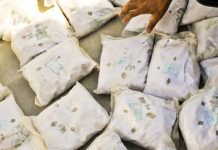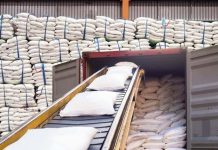ISLAMABAD: Prime Minister Imran Khan Tuesday said the former rulers should be punished for taking the country’s loans from Rs6 trillion to Rs30 trillion in 10 years.
He was addressing the inaugural ceremony of the FBR’s Track and Trace System (TTS) for gauging sugar sector’s real production. He called the rollout of the TTS a watershed moment in the development of the country’s economy and hoped that it would lead to much-needed economic prosperity in times to come.
“It is an integrated, technology-based solution that shall ensure accurate reporting of production volumes through real time monitoring of manufacturing by the affixation of tax stamps, improve quality control and thus ensure increased revenue collection,” he added.
About the loans taken by the previous rulers, the premier said no major works were done, no dam was built and no structure programme made, which would be a source of income. The PM said “what can I say about the money wasted by the prime ministers of our indebted country abroad, they spent 10 times more than my visits abroad. When a ruler does not realise that he is spending people’s tax money, people will not pay him taxes and it will not become a culture”. He continued that when so much debt was piled up in the country, now the challenge of his government was to collect record tax. He was hopeful the Federal Board of Revenue (FBR) would be able to collect a record Rs6,000 billion in taxes. He said he had wished long ago that there should be Rs8,000 billion tax collection in Pakistan and “I hope that the speed at which we are going, will achieve the target and this will be possible with the help of technology”.
He acknowledged the FBR role was very important because country’s survival depended on it: It has almost become a national security issue “because we need money for our children”. “I hope that when you convince the general public that their money is being spent on them and the luxurious life of the ruling elite is curtailed on the people’s tax money, tax collection will increase and it will be easier to raise money and people will have no problem paying taxes. He said that he would personally oversee the system and see how much capital was raised. PM Khan said the FBR and governments had been working on the system since 2008, but it had been inaugurated in 2021, and from today, this system would be implemented in sugar industry and then in other sectors including cement, fertiliser and steel industry.
PM Imran emphasised that this is a positive step, which would have far-reaching effects, as our biggest problem is that we don’t have enough money to run our country, which is why we have to borrow. He called for developing a tax culture for the country’s stability, insisting the past rulers be punished for taking Pakistan’s loans from 6 trillion to 30 trillion in ten years. “We have never had a tax culture and people did not consider tax evasion a bad thing, partly because of the colonial system, because people from outside used to come and take the money, while those who think that this tax will be used for them pay taxes. So their attitude is different,” he added.
He said that after independence, our ruling elite did not allow a tax system to flourish because people had their own separate lifestyle on tax money. He added that this culture was never allowed in the Western countries: The annual income of England is 50 times more than that of Pakistan. Look at the lifestyle of ministers there. When their ministers go out, they have orders that if their travel is less than five hours, then they should travel in economy class. If the prime minister of UK goes to the United States, PM Imran pointed out, he stays in the embassy there so that they do not have to spend money in the hotel.
He recalled that when he was in university, students there used to say that it was their tax money and they were spending it wrongly. The people were watching and the rulers knew they were accountable. He said that “due to these two reasons, our tax culture has not been created. Now we have reached this point, it is important for us to have a tax culture because now our country’s stability depends on it; we cannot afford to go on like this; from 2008 to 2018, the amount of loans increased by four times.”
The PM said that it was hoped that the tax collection would reach Rs6,000 billion, out of which Rs3,000 billion would go to the debt repayment and Rs3,000 billion would be left for 220 million people: to take care of their health, to build hospitals, to build schools, most importantly to make the educational institutions. He said “if we invest in our agriculture, there is a lot of potential in it. But how much money is left for all of them? Then we have to take loans and pay interest on it. “We are stuck in the same cycle, it will break only when we increase tax collection and they will only when we move towards technology,” he added.
The PM said the present government was the first one to break the nexus of tax evaders, vested interests and mafias. “We have not been afraid of taking difficult decisions nor shied away from plugging loopholes by enacting legislation that restricts corrupt practices and ensures transparency and fairness,” he added. He added that the vested interests resisted our drive and efforts to improve regulatory oversight of the economy despite knowing that without sound economic practices and enhanced revenue collection, we would not be able to allocate funds for human development, infrastructural improvement, health, and education sector. The FBR’s track and trace system would also ensure electronic monitoring of production and sales of key sectors such as tobacco, fertilizer, sugar and cement products. This will increase the country’s revenue, create transparency in the system and prevent tax evasion in these sectors. Under the TTS, from Nov 11, 2021, no bag of sugar could be removed from the production site, factory and manufacturing plant without stamps and individual identification marks. In the next phase, the FBR plans to implement the TTS in the beverage and petroleum sectors as well. He congratulated the FBR officials and paid tributes to them on the record tax collection.
Separately, Prime Minister Imran Khan also presided over a meeting on pollution-related issues in the country. He said that a sustainable environment protection plan was needed to fight pollution, especially in major cities. He directed the relevant departments to devise a strategy in coordination with the provincial governments to save our major cities from pollution, by taking all necessary steps, at the earliest. “In line with our manifesto, clean and pollution-free Pakistan is our top priority, and long-term measures should be taken to deal with the climate change related issues. “We are focused on maximising green cover of our cities through massive plantation,” he added.
The meeting was attended by Information Minister Chaudhry Fawad Hussain, Special Assistant to Prime Minister (SAPM) on Climate Change Malik Amin Aslam, SAPM on Political Communication Dr Shahbaz Gill and senior officers concerned. Punjab Chief Secretary Kamran Ali Afzal, Senior Member Board of Revenue (SMBR) Babar Hayat Tarar also joined the meeting via video-link.
PM Imran said the government was taking steps on priority basis to increase economic activities in the country, as increasing investment in the export industry was creating jobs. He contended that all government agencies were working together to provide a conducive environment for investors while the government was taking steps to speed up work on CPEC phase-2. In this connection, a review meeting of priority sectors was held under the chairmanship of Prime Minister Imran Khan, who was given a detailed briefing on the progress of phase 2 of the China-Pakistan Economic Corridor.
The meeting was informed that work on gas and electricity supply in Rishakai, Dhabeji, Allama Iqbal and Bostan Special Industrial Areas (SEZs) was in full swing. The electricity and gas required for the construction of industries are available, while the remaining required electricity and gas will be supplied along with the investment in the industries.
In this regard, Plug and Play Model has been proposed by the CPEC Authority on which work is in progress. Under the model, all the needs of the investors would be met through one-window operation to accelerate the construction of industries in these areas. At the same time, the Board of Investment was working on a portal to provide investors with information on construction of industries, approval from various institutions and other important information, which would be launched soon. The meeting was also informed that a regular system had been launched to review the progress of projects under CPEC and to expedite the development work. In addition, steps are being taken to increase investment in SEZs by identifying export sectors and industries. In the agricultural sector, not only work on corporate farming was in full swing, but also agreements were being made to increase the exports of the sector.
The PM ordered for completing all steps related to CPEC Phase-2 within the stipulated time period. The meeting was attended by federal ministers Asad Umar, Hammad Azhar, advisors Shaukat Fayyaz Tarin, Moeed Yousuf, Special Assistant Dr Shahbaz Gill, Chairman CPEC Authority Khalid Mansoor, Chairman Board of Investment Azfar Ahsan and relevant senior officials.
Source: The News – November 24, 2021














